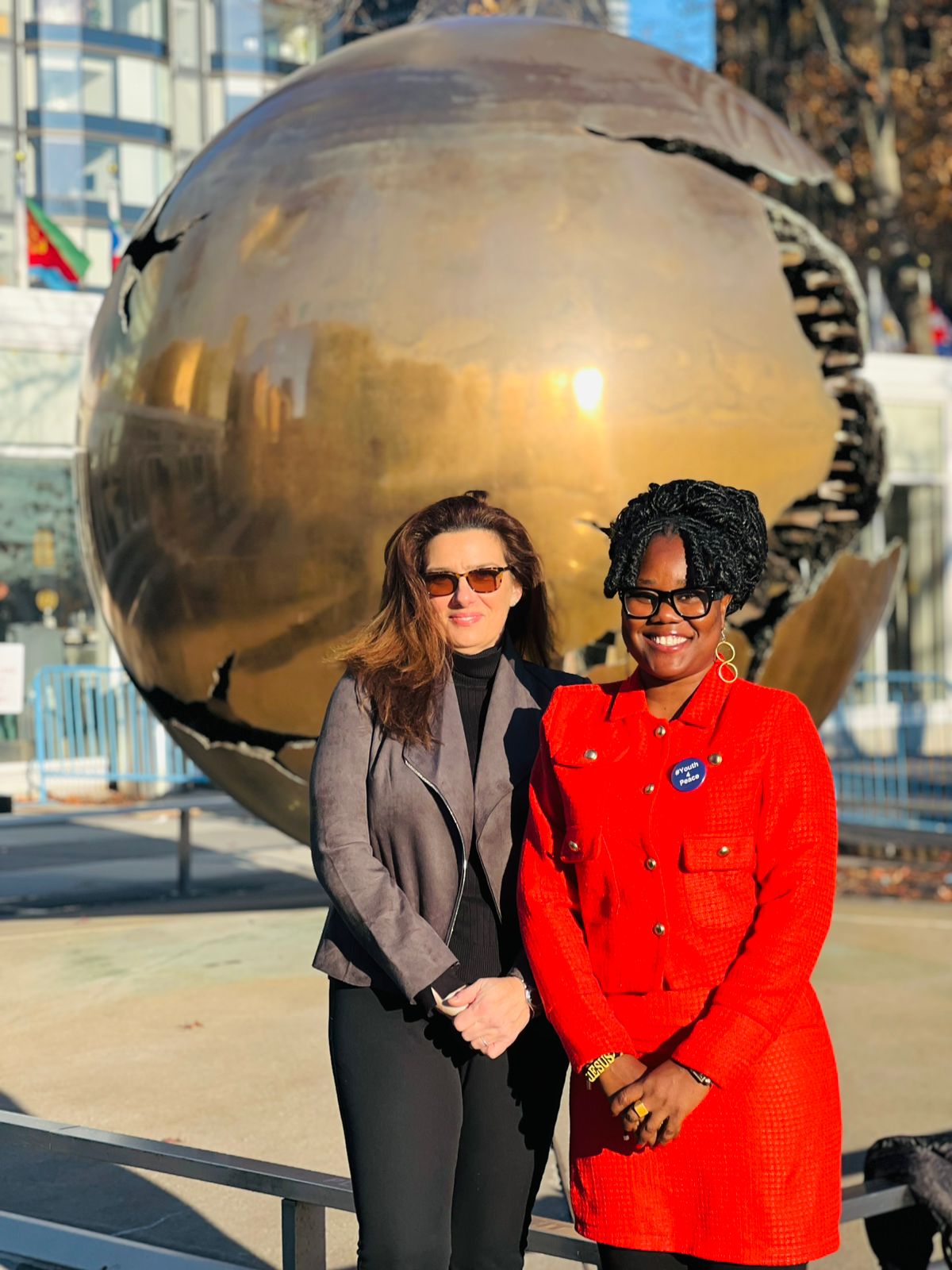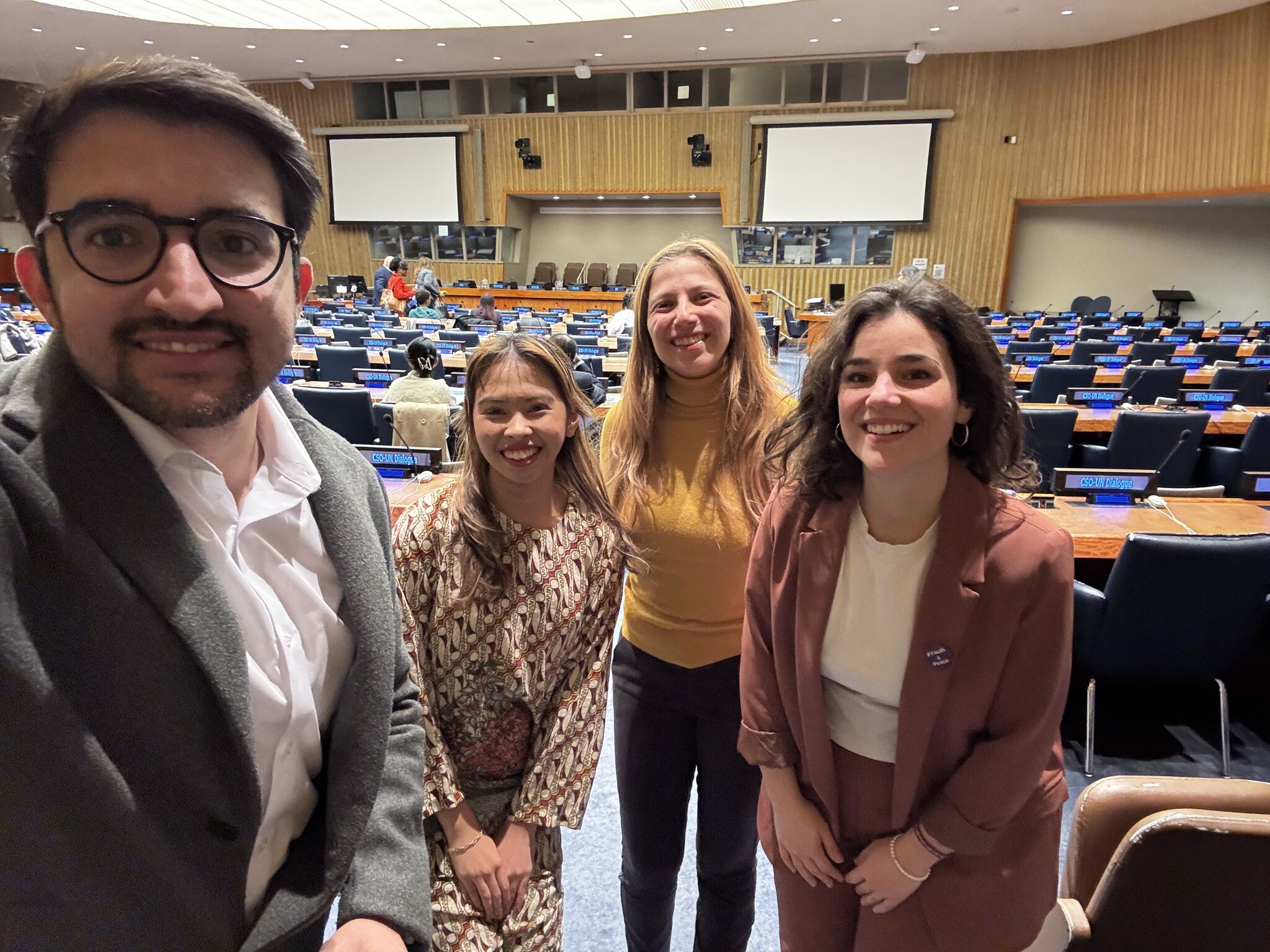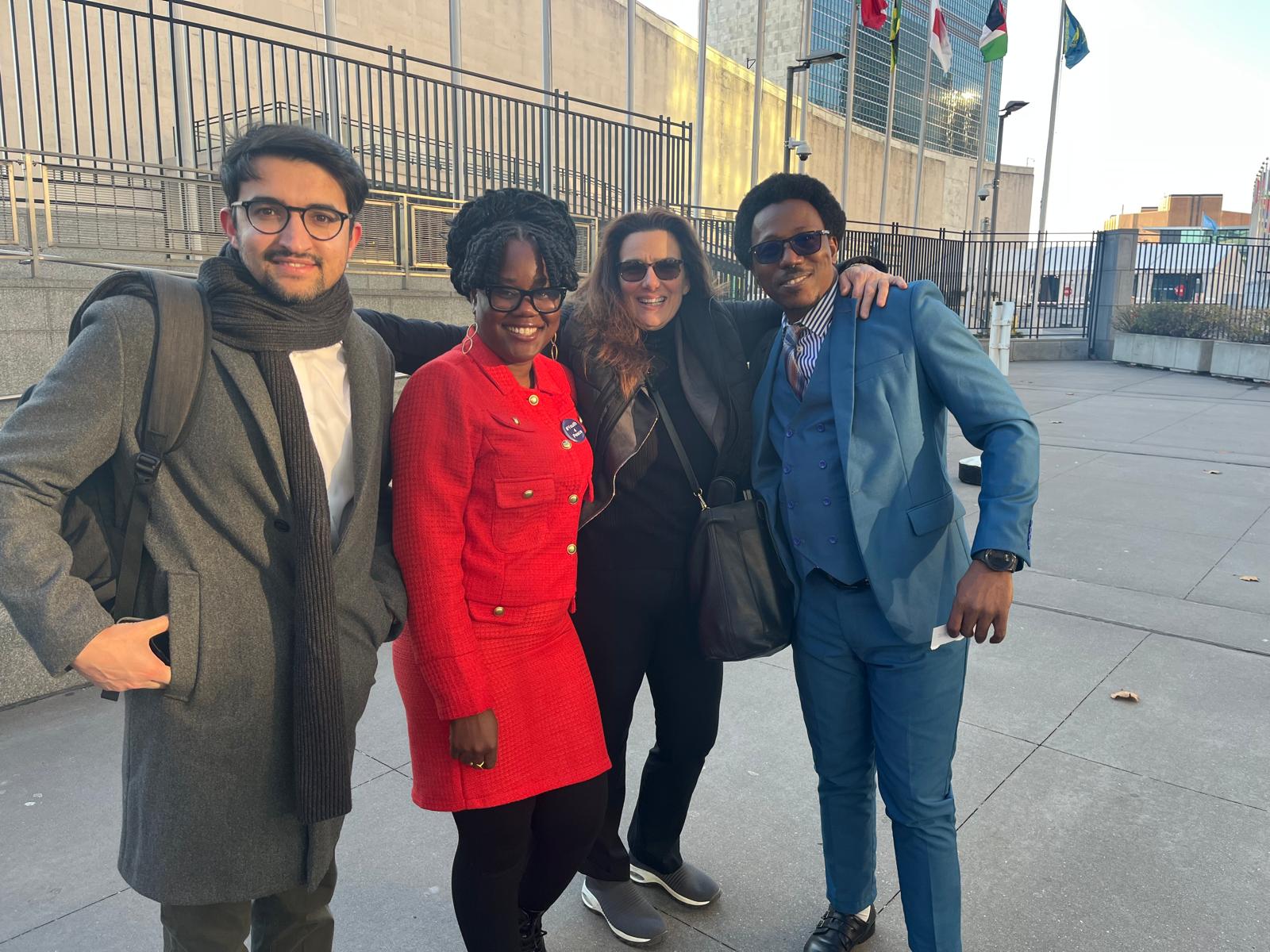
Building and Sustaining Peace Together
Reflections on the 2nd Annual CSO-UN Dialogue on Peacebuilding
Mid-December 2024, the 2nd Annual CSO-UN Dialogue on Peacebuilding brought together diverse civil society actors, Member States, and UN representatives to address urgent peacebuilding priorities. In the face of increasingly complex and multitude of global challenges, this dialogue offered an important platform to advance meaningful civil society inclusion, strengthen multi-stakeholder partnerships, and foster trust-building across local, national, regional and global stakeholders.
CSPPS members from across the globe participated in this meeting and shared their inputs and reflections on ways to strengthen support for conflict prevention and to make peacebuilding optimally impactful.
We invited CSPPS-participants to share their key takeaways from the meeting and express their reflections and future-oriented recommendations following this UN-CSO Dialogue. The below-mentioned items link to the themes discussed during the meeting and end with a few recommendations on best ways to proceed from the Dialogue.
- Conflict prevention as an overarching theme
The opening session underscored the indispensable role of civil society in addressing rising record-breaking violent conflicts and drivers of violence. CSO leaders, representing CSPPS, emphasised the need for robust vision, leadership, and partnerships to address global crises, while also highlighting civil society's unique position to foster trust and accountability in peacebuilding efforts. However, prevention strategies are not “one size fits all” and must be context-specific and always conflict-sensitive. CSPPS members applaud the creation of an impact coalition on peacebuilding as a significant achievement and hope the commitments in the Pact for the Future translate into actionable change. However, policies must have actionable outcomes, including building effective partnerships and addressing funding challenges.
The Dialogue also emphasised the need for inclusive national strategies that address a broad range of issues, including social injustices, violence against women, and emerging forms of violence. Civil society’s critical role in fostering inclusivity and contributing to integrated approaches to prevention was also highlighted, with CSOs stressing that prevention efforts must go beyond conflict resolution to tackle structural drivers of violence.
"What are we, as a society, doing that leads the children and youth in our communities to dream of joining the war as they grow up? Complex problems demand complex solutions, achievable only through alliances, cooperation, and a commitment to rigorously measuring the impact of our actions"
Natalia Pelaez, Fundación LATIR - Colombia, CSPPS member
The gap between high-level policies and effective implementation at the country level was frequently empathized during the discussion. Translating ambitious commitments into meaningful action remains a persistent challenge. Discussions stressed the importance of inclusive national action plans and the role of member states as champions of the Youth, Peace and Security Agenda. In this context, the need for consistent engagement between civil society and the UN at local and national levels, powered by effective communications strategies adapted to the realities of local contexts, was also outlined
“If high-level policies are not robustly actionable, practicable and resourced, then they are just words on paper, without any hope of meaningful change required to ensure the paradigm shifts needed to meet the greatest challenge of our time–violent conflict. If we are serious about reducing and preventing record-breaking violent conflict and violence, then we need to resource and prioritize peacebuilding and ensure it is integrated throughout all development and humanitarian assistance.”
Liz Hume, Executive Director, Alliance for Peacebuilding - USA and Co-Chair CSPPS

- Financing for peacebuilding:
Financing for peacebuilding remains a critical barrier for civil society organisations (CSOs). Participating stakeholders called for new models of collaboration, based on mutual interests rather than goodwill. The private sector’s potential role in adopting conflict-sensitive practices and contributing to integrated peacebuilding efforts was highlighted, along with the importance of incentivising collaboration among UN agencies, CSOs, and the private sector. There is a clear need to advocate for robust funding for peacebuilding, through platforms like the Financing for Development Conference, in 2025. To this aim, we need to start by strongly advocating for the operationalisation of the General Assembly Resolution to invest in prevention and peacebuilding funding.
"Financing peace transforms strategies into solutions and visions into actions; because without funding, peace remains a distant hope, but with adequate financing, civil society can forge real and lasting change in a world crippled by unprecedented global conflicts."
Gwendolyn Myers, Messengers of Peace - Liberia, Co-Chair, CSPPS
However, it is not only about securing more funding, it is also about how funding is allocated by the UN. Funding for locally led CSOs needs to be flexible, adaptive and available, which requires procurement reform to address the barriers of complicated contracting mechanisms and restrictions.
In countries like Colombia, it was noted that UN agencies have sometimes become competitors with local CSOs for grants and government funding, further limiting access for locally-led organizations to resources for their peacebuilding initiatives. Conversely, other countries reported positive experiences with UN agencies at the national level, demonstrating the feasibility of inclusive collaboration with local CSOs. One effective approach highlighted was the creation of UN-CSO committees to oversee funding allocation and project implementation. CSO participants strongly recommended that the UN systematize these good practices, to ensure they are integrated across the Peacebuilding Architecture at all levels.
- Civil society inclusion and partnership
Dialogue interventions focused on leveraging upcoming anniversaries, such as the 25th of UNSCR 1325 on Women, Peace, and Security (WPS), and 10th Anniversary of UNSCR 2250, on Youth, Peace and Security (YPS), to advocate for greater inclusion of women and youth in peace processes. Various speakers called for reimagining multilateralism and ensuring the sustainability and impact of the CSO-UN Dialogue as a platform for institutionalised partnerships between civil society and the UN. Recommendation, made in this context, was also to ensure support for civil society proposals in upcoming UN resolutions, to ensure inclusivity and effectiveness. In addition, the importance of effective communication strategies to translate global resolutions into actionable frameworks, at the local level, was repeatedly emphasized. This would enable CSOs to better engage in advocacy activities within their spheres of influence, ensuring that international policies have tangible impacts on the ground.
The dialogue recognised the current crisis in multilateralism, with civil society playing a pivotal role in addressing deficits and building trust. CSOs emphasised the need for a renewed focus on civil society’s contributions to multilateral processes and their ability to address global crises. Civil society’s engagement was framed as essential to re-imagining a more inclusive and effective multilateral system.
YPS-agenda, Youth engagement and transgenerational prevention
The discussion underscored the importance of youth involvement in peacebuilding as part of a transgenerational approach to addressing trauma and memory. Youth were recognized as essential actors in re-imagining prevention, fostering generational change, and ensuring sustainable peacebuilding. The need for young people to actively shape and participate in the upcoming progress study on Youth, Peace, and Security (YPS) was emphasised, with a call for their involvement in its design, implementation, and evaluation. The independent progress study represents excellent opportunities to reflect on the YPS agenda, evaluate its successes and shortcomings, and propose effective and actionable strategies to bring it to reality and make communities feel its impact. Brought to the forefront, is the recognition that the YPS Agenda and UN resolutions remain largely unknown to youth, local governments, and grassroots CSOs. While technology and the internet have been effectively utilized to promote awareness of YPS in some contexts, communication and implementation strategies must be tailored to diverse local realities. This requires bridging the information gap to meaningfully include marginalized youth, particularly those living in poverty and rural areas.
Bridging the YPS and WPS Agenda
The YPS and the WPS agendas are closely interconnected. Sharing the lessons learned, successes and challenges from the implementation of the Women Peace and Security agenda can enhance the effectiveness of YPS-agenda. The coordination between these two agendas is needed both at national and international levels. Organisations, which target both WPS and YPS in their programs, can close the gap and create long-term impact on peace and security. Bridging these two agendas raises holistic awareness and promotes understanding in broader ways.

- Peacebuilding architecture review and its process in 2025
We hope that meaningful and continuous consultation with civil society organisations will be a critical part of the 2025 UN Peacebuilding Architecture Review which will be tabled. As reiterated during the meeting, the inclusion of grassroots perspectives in global policy discussions is of pivotal importance. Equally crucial is the need for clear strategies to measure progress in peacebuilding and to track the commitments made by the UN and member states. These elements are essential to ensuring transparency, accountability, and collective advancement toward achieving peaceful and inclusive societies.
The Peacebuilding Commission (PBC) is a critical advisory body that must be enhanced during the upcoming review to ensure robust support of the peace agenda in conflict-affected countries. The PBC is composed of 31 Member States with the Peacebuilding Commission Support Branch (PBCSB) within the Peacebuilding Support Office (PBSO), and the Department of Political and Peacebuilding Affairs (DPPA), providing substantive and technical support to the Peacebuilding Commission. The PBC is vital to developing a new culture and mindset so that peacebuilding and prevention are key to ensuring a sustaining peace pillar across the UN system. While the PBC needs more infrastructure, both human and material, to be able to better brand peacebuilding and develop a more compelling and impactful narrative. But this also requires stronger partnerships with CSOs and requires regular meetings and timely discussions to ensure greater political and financial support.
- The Second UN-CSO Dialogue:
CSPPS members have appreciated the opportunity to participate and engage in this 2nd UN-CSO Dialogue. The direct interaction with representatives from various UN Agencies and Member States has been welcomed and appreciated.
“This year we have seen the greatest participation of civil society so far, a direct result of the unique co-leadership model used in the organisation. Indeed, global and regional peacebuilding networks and organizations were part of the core group organising this Second Dialogue.”
Khaled Emam, Justice Call - Egypt, CSPPS Member
Representatives believe that this dialogue was more inclusive than other UN-meetings attended. Despite commitments towards multi-stakeholder partnerships and inclusive processes, civil society actors are not usually structurally included in policy dialogue processes. Several participants noted that a key element now lies in the follow-up to this dialogue. CSPPS representatives have called for a clear matrix, on follow-up of key recommendations.
Participants also highlighted the pivotal importance of the inclusion and participation of young peacebuilders within the Dialogue and the importance of their input for the future of peacebuilding.
Participants believe there are ample opportunities to make a better connection between activities implemented by civil societies and the way learning lessons, emanating from these activities, are given uptake at the UN level. Time and resources need to be invested in better learning from good/next practices - and these lessons need to be shared as these can be transversal and inspirational to others active in this domain.
It is critical to plan for a 3rd UN-CSO Dialogue, and more time should be invested in the preparatory process so that civil society organisations have sufficient time to solicit and develop recommendations from their communities.

Recommendations moving forward
To guarantee the outcomes of the Second UN-CSO Dialogue on Peacebuilding translate into meaningful impact, it is vital to produce a comprehensive outcome document. This document should include a clear matrix, outlining follow-up mechanisms for the dialogue’s recommendations, ensuring transparency and accountability across all stakeholders. Additionally, fostering partnerships among the UN, civil society organizations (CSOs), the private sector, and the governments is essential for advancing prevention and peacebuilding initiatives. Leveraging the Peacebuilding and Prevention Fund (PFD), to support collaboration among these stakeholders, can further enhance the reach and effectiveness of peacebuilding efforts.
Inclusive youth participation must be emphasized, especially in the upcoming progress study on Youth, Peace, and Security (YPS). This includes engaging youth—particularly those living in marginalized conditions—in the study’s design, implementation, and evaluation processes, ensuring their voices shape global and local policies. Engagement with UN country teams to work directly with CSOs is vital for localized implementation of peacebuilding strategies. To facilitate these efforts, donor agencies should provide flexible long-term funding, tailored to the needs of youth-led initiatives and locally-driven programs. Simplifying procurement processes is also essential to increase accessibility for grassroots organizations.
Aligning the Youth, Peace and Security and Women, Peace, and Security agendas can further strengthen peacebuilding frameworks. Sharing lessons learned and fostering coordination at all levels — global, regional, national, and local — will ensure coherence and amplify impact. Developing common coordination frameworks will also address intersecting challenges in a more holistic manner.
Finally, as civil society actors, we emphasize the need for robust accountability mechanisms to monitor progress on peacebuilding and UN commitments. Implementing effective communication strategies is essential to transform global resolutions into actionable frameworks, empowering CSOs to advocate effectively within their spheres of influence. Together with sustained engagement and investment in preparatory processes for future dialogues. These measures are fundamental to fostering trust, inclusivity, and long-term peacebuilding success.
